Nobody tells you that mothering (especially full-time, professional mothering) is such a physical job. That “tired stay-at-home mom” is redundant.
If you try to list physically tasking jobs, likely to make the list are vocations like construction work, power-lifting, professional housekeeping, high-rise window-washing, nursing. I can’t claim to have any personal experience with any of those careers, and I certainly don’t downplay any of them.
It was just a surprise to me.
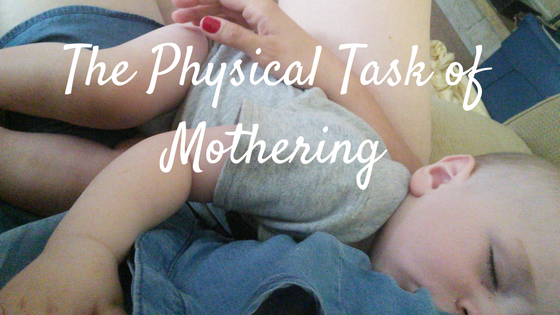
And I’m not just talking about the physical aspects of pregnancy, delivery, and those first “lost weeks” postpartum. Of course those are a Herculean physical strain, but I think those are decently well-recognized.
I’m talking about the long term. The sleep deprivation doesn’t stop, it just changes. After you teach your child to sleep through the night, you start sacrificing sleep to things like housekeeping, hobbies, tea with yourself, and worrying.
 Instead of enjoying your soft pillows at 9:30, you lie awake until midnight thinking about things like taking bread of out the freezer for tomorrow, whether your toddler’s room is warm enough, if your husband’s alarm clock is set properly, how your ill friend is feeling, what errands you need to run tomorrow, the new parenting theory you are planning to try.
Instead of enjoying your soft pillows at 9:30, you lie awake until midnight thinking about things like taking bread of out the freezer for tomorrow, whether your toddler’s room is warm enough, if your husband’s alarm clock is set properly, how your ill friend is feeling, what errands you need to run tomorrow, the new parenting theory you are planning to try.
Once you’re up for the day, the cooking and cleaning begins. These are physical tasks in their nature, but please add to that effort a 20 pound toddler on your hip or in a carrier.
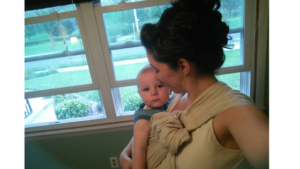 There is walking the dog and/or running errands. Which sounds easy, but actually requires pushing a stroller/cart (maybe a double or triple) with somewhere between 20 and 80 pounds of child in it, and holding back an overly-enthusiastic pooch who wants to follow every pedestrian home.
There is walking the dog and/or running errands. Which sounds easy, but actually requires pushing a stroller/cart (maybe a double or triple) with somewhere between 20 and 80 pounds of child in it, and holding back an overly-enthusiastic pooch who wants to follow every pedestrian home.
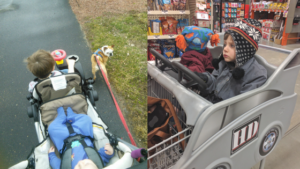
The bending. The stooping. The heavy lifting and repetative motions and chasing and hoisting and bending into cribs.
The Legos.
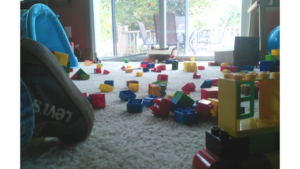 Then the wrestling of a kicking screaming toddler to a timeout, or a bathroom, or an unwanted nap. The holding and pacing and singing with the ever-growing baby, which may take up to an hour before he falls asleep.
Then the wrestling of a kicking screaming toddler to a timeout, or a bathroom, or an unwanted nap. The holding and pacing and singing with the ever-growing baby, which may take up to an hour before he falls asleep.
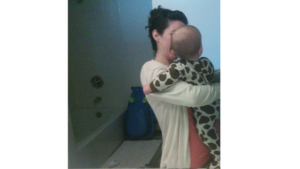 You are a human jungle gym. A toddler falling down will use a tiny portion of your arm or leg skin as a handle. A baby wanting a kiss will slam his forehead into your teeth. Someone learning about body parts will jam a jagged fingernail into your eye, nose, ear, or belly button.
You are a human jungle gym. A toddler falling down will use a tiny portion of your arm or leg skin as a handle. A baby wanting a kiss will slam his forehead into your teeth. Someone learning about body parts will jam a jagged fingernail into your eye, nose, ear, or belly button.
All of that physical exertion and damage is separate from nursing a baby for weeks, months, or years. If you choose to do that, you are quite literally sitting without moving for up to an hour at a time, 8 or more times a day.
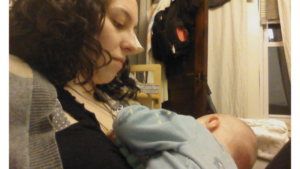 You can bet your child will only sleep held in that position, some days, or will only nurse in certain ways that leave you with neck cricks and sleeping legs. There might also be pumping, which is just as (if not more) uncomfortable, but without the perk of baby snuggles. And if your baby happens to sleep extra long, you don’t! You set yourself an alarm and get up to pump. Or risk mastitis. Y’know.
You can bet your child will only sleep held in that position, some days, or will only nurse in certain ways that leave you with neck cricks and sleeping legs. There might also be pumping, which is just as (if not more) uncomfortable, but without the perk of baby snuggles. And if your baby happens to sleep extra long, you don’t! You set yourself an alarm and get up to pump. Or risk mastitis. Y’know.
(This in no way is meant to discount the role of fathering. Here is my sweet husband, falling-down exhausted with each of our infants. Incidentally, two of my favorite photos of all time.)
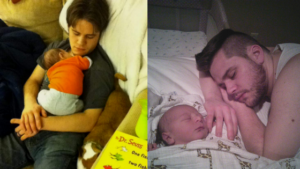
I hope the cute factor of the photos to accompany this post help drive home my true objective:
Mothering will wreck you. Hopefully, this is temporary. (I haven’t yet come out the other side, so I can’t promise anything!) Your metabolism, hormones, physical appearance, eye bags, sleep, joints… these may never be the same.
But honestly, what better to give yourself for? What more awesome task can there be, than to relinquish selfishness of your physical body in order to serve your family? At the end of the day, you may be completely depleted, but all of that energy and effort went into your kids. You’ve poured from what the Lord has given you into others.
Tiny, snuggly, adorable others.

It’s worth it.
